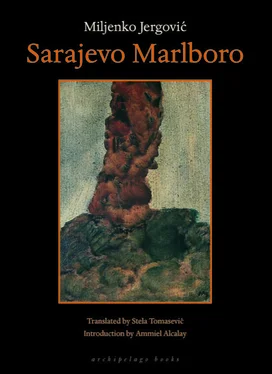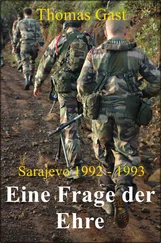*Sarajevo Marlboro — a brand of cigarettes developed by Philip Morris Inc. to suit the taste of Bosnian smokers. The tobacco company made a study of the local cuisine before launching the product, according to a practice that is widespread in other parts of the world. That’s why Marlboro varies from country to country, and from manufacturer to manufacturer, and why a smoker can find the taste of a foreign Marlboro unpleasant. The experts from Philip Morris were especially pleased with their Sarajevo product, it seems, and believed that the tobacco in question, which grows near Gradačac and Orašje, was generally one of the better blends.
Izet was what they call an eglen-effendi, or brilliant talker. He could talk non-stop from dusk to dawn. One story flowed into another, one event turned into the next. Often he’d use the day’s events to begin a story that would range across whole centuries and finally return to the price of meat or some gossip about a fellow called Hido who led a ram across Mount Jahorina just before the animal sacrifice of Bairam, right through the Serb positions, until he reached the Višegrad gate, where he was hit by a UN armored truck — I swear to God — and thrown into a ditch while the ram was killed instantly. There was no end to Izet’s stories, just as there’s no end to time, the past or the future. But they were never dull and they usually had a message or a moral and were seldom erratic: a tiny thread of narrative kept you holding on to the story, and forced you to listen, even if it meant that you had to go hungry or without drink, or that your life as a whole became a tense silence in which things only mattered if they could be described by a storyteller.
At the outbreak of the war Izet was staying at Vraca. Before he could even blink, let alone run away, a gang of Chetniks turned up outside his house. His neighbor Spasoje immediately began to point the finger at Izet. It was very sad. Until the day before, the two of them were always drinking rakija together. Spasoje was as good as gold and as harmless as a water-pistol. But on the day in question he dressed up in a black uniform, with a knife flashing at his waist, and his beard seemed to have grown overnight, as though he’d fertilized it with manure. Anyway, he was outside Izet’s door yelling that he’d slit his throat if he didn’t open up. Suddenly Izet lost his tongue, and his knees began to tremble. He didn’t want to open the door. He didn’t really want to keep it shut either. But since he couldn’t say anything in reply, only being able to manage a hiss in the back of his throat, he just made his way to the door and painstakingly fumbled with the key in the lock. He could smell the rakija on Spasoje’s breath through the wooden door. As soon as he opened the door he was hit in the face by a rifle-butt. Izet fell to the ground like a stone. He was so light that Spasoje was able to pick him up by an arm and a leg, and carry him through Vraca. Blood was pouring down Izet’s face but he was still conscious. Even so, it was impossible for the eglen-effendi to utter a single word.
His neighbor didn’t let go of Izet until he reached the Stara Rampa bar. He carried him inside the building, where pictures of King Petar and Draža Mihailović had sprung up overnight. Yet there was no sign of any barroom furniture. Instead, five men in uniforms sat at three tables in the empty room. Spasoje dumped Izet on the floor in front of the soldiers, but the wounded man quickly got to his feet. A fair-haired captain wearing the uniform of the Yugoslav National Army pulled up a chair for Izet.
“Where are your weapons?” demanded one of the other soldiers, who had a beard down to his belly-button.
Izet opened his mouth but only the hissing sound came out. The bearded Serb repeated the question, and Spasoje delivered another blow with the rifle-butt. Izet was feeling dizzy. He could see that his captors weren’t fooling around, and so he began to make up plausible lies, except he couldn’t give voice to any of the stories. As the question was repeated for a third time, the five soldiers jumped up, almost fighting one another for the privilege of hitting Izet. In the end he was pummelled from all sides. At one point he imagined that he heard an echo in his ears as if the Chetniks were beating somebody else, or as if the neighborhood children were shaking the apples off the tree. The lies slipped his mind, and he drifted first into indifference and then into a soft comfortable darkness from which he didn’t emerge until the next day.
He woke up battered and broken, with his arms and legs tied, in the cellar of the bar. The first thing he saw when he opened his eyes was a pile of tables and chairs. On top of them lay Mijo Penava, also battered and tied up. He was the butcher from Lenin Street who’d cut off his left thumb six months ago. The two of them looked at each other for about ten minutes, Izet lying on the wet cellar floor and Mijo on the heap of furniture that was almost collapsing.
“Why did they put you up there, you poor thing?” said Izet, who had by now recovered his voice.
“Because they threw you down there, I guess,” replied Mijo.
“What did they want to know so badly that they had to beat you to a pulp?”
Mijo was trying to put his head between two chairs. “The same thing they asked you, I guess.”
“And what did you tell them?”
“I said whatever came to mind. But now they want me to lead them to the place where the guns are hidden. Dammit! How will I show them what isn’t there? If I tell them I was lying, they’ll just beat the hell out of me. I have to think of something else. Blow me if I know what. And you? How did you butter them up?”
“I lost my voice so I couldn’t tell them anything. I opened my mouth but the volume was switched off. Mind you, I’d have told them whatever they wanted to hear, just as long as they didn’t reach for their knives. Except I couldn’t, for the love of God. D’you think I’m being punished for having a tongue that’s quicker than my brain? How unfair! Just when life depends on it, my tongue gets knotted up.”
“Tell me then,” said Mijo, “what story can I make up so I don’t have to lead them to the weapons?”
Izet considered the question, licking his dry lips. He knitted his brow for a moment and then suddenly opened his eyes wide as if he could see the story he was about to invent.
“Here’s what you’ll tell then, Mijo: all the guns you talked about were picked up by that guy Zvonko who worked as a bouncer at the Lav nightclub. They won’t be able to check the story, because Zvonko has escaped with his wife and mother to town, to stay with that smalltime crook who owns the jewelry shop on Slatko corner. Then you tell them that the jeweller used to be a Ustasha, and that he always acted against Yugoslavia, and that he more or less brainwashed Zvonko. You can say that he spent time as a political prisoner on the island of Goli Otok because it was alleged he had ties with the Russians, and that he sent his mother to an old-people’s home, even though he owns three villas in Sarajevo and Split. Tell them it’s easy to recognize the guns by the sound of the bang — it’s kind of dull, like you were using a silencer but it wasn’t fitted correctly.”
“And what’s this dealer of Zvonko’s called?”
“Make something up on the spot — a Muslim name, though, so they get the idea that Zvonko has links with both sides, and that’s why he wouldn’t have told an out-and-out Croat like you what they were planning to do with the weapons.”
Soon afterwards the Chetniks came and took Mijo away for more questioning. Izet never saw him again. But when his turn came to be interrogated again — would you believe it? — his throat seized up again and he found that he was unable to speak a word. Three times the soldiers beat Izet until he was unconscious, only to revive him and start the questioning again. In the end they decided that Izet was a big-shot. “Well, he must know a lot if he’s not talked yet,” they reasoned. So they didn’t sling him back into the cellar. Instead they put him in a room with a bed, fed him well and gave him enough to drink — and then they took him to Lukavica. He was questioned there by several colonels, but they didn’t bind his legs or his arms, and they even offered him coffee and cigarettes. After a while Izet got his voice back. Now he could tell the Serbs whatever he wanted, except they were no longer interested in guns: they wanted to know his rank and various troop formations. As Izet had never served in the army, he didn’t know anything about the latter, but self-importantly he proclaimed that his rank was that of colonel of the Green Berets. And as for military plans, he went on, they might as well kill him because he wasn’t going to reveal any secrets. Of course he wasn’t lying in that respect — he couldn’t invent things about a subject he didn’t understand.
Читать дальше










